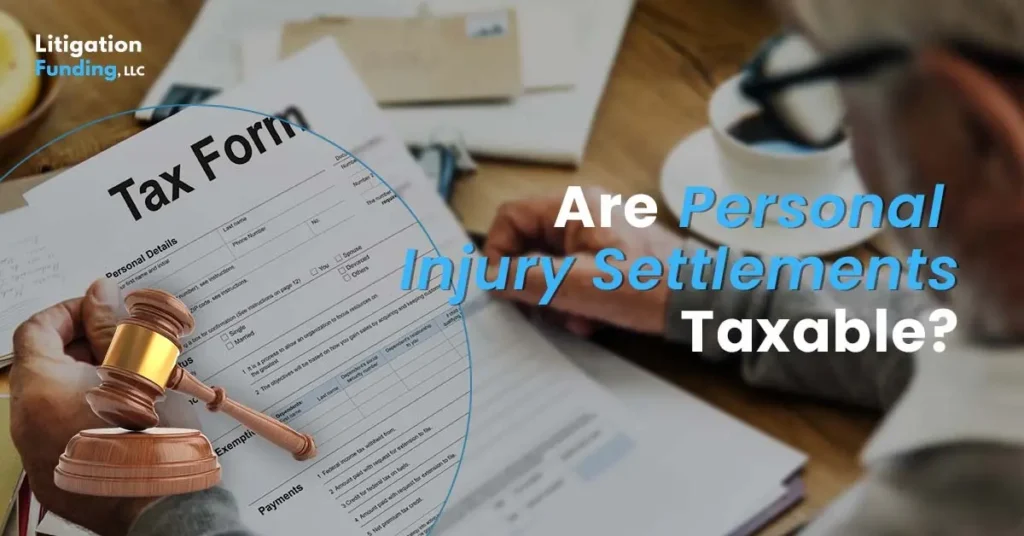Receiving a personal injury settlement can feel like a major relief after months of financial and emotional stress. But once compensation arrives, the question of taxes often comes up, and the answer is not always straightforward.
The IRS treats different portions of a settlement differently, depending on whether they relate to physical injuries, emotional distress, lost income, or punitive damages. Understanding these distinctions helps you avoid surprises and plan ahead with confidence.
How the IRS Handles Personal Injury Settlements
The IRS has specific rules under Section 104(a)(2) that explain when lawsuit settlements are taxable. In simple terms:
- If your settlement compensates you for a physical injury or sickness, it is usually not taxable.
- If your compensation is unrelated to a physical injury, such as emotional distress or punitive damages, it may be taxable.
For example, if you were in a car accident and received money to cover medical bills and pain linked to physical injuries, that amount is generally not taxable. On the other hand, if you won additional money in court as a punishment for the defendant’s reckless behavior (punitive damages), that part of the settlement is taxable.
This means that the IRS does not treat all settlements the same way. So, are personal injury settlements taxable by the IRS? The rule is simple: physical injury-related compensation is tax-free, but anything outside of that may be taxed.
What Parts of a Personal Injury Settlement Are Non Taxable
The good news is that a large portion of most settlements falls into the non-taxable category.
Medical Expenses Reimbursement
Money received for past, present, or future medical bills is not taxed because it directly covers your treatment costs.
Lost Wages Tied to Injury
If you missed work due to physical injuries, the compensation for those lost wages is generally non-taxable.
Pain and Suffering
When linked to a physical injury or illness, pain and suffering damages are excluded from taxable income.
Emotional Distress from Physical Injury
Emotional suffering caused by an accident-related injury is also non-taxable under IRS rules.
So, if you are wondering, Do you pay taxes on personal injury settlements?, the answer for these categories is no. These are considered non-taxable personal injury settlements because they directly compensate you for harm suffered.
What Parts of a Personal Injury Settlement Are Taxable
While much of a personal injury settlement is tax-free, certain parts are considered taxable personal injury settlements and must be reported as personal injury settlement taxable income.
Punitive damages
Extra payments designed to punish the defendant, not compensate you. Always taxable.
Emotional distress not linked to physical injury
If you receive money for stress or anxiety unrelated to an injury, it is taxable.
Interest on settlements
If your settlement accrues interest while being processed, that interest is taxable income.
Attorney fees in some cases
Depending on how your settlement is structured, a portion of attorney fees may also be taxable.
In short, if a part of your settlement is not tied directly to physical harm, expect it to fall under taxable income.
State Laws and Tax Variations
Federal IRS rules apply nationwide, but each state may have its own tax treatment for settlements. For example, while federal law excludes most physical injury settlements from taxation, some states may apply additional rules on emotional distress awards or interest earned on settlements.
It’s important to check with a tax professional in your state, as state taxation can differ from federal rules. This ensures you comply with both federal and local requirements.
Personal Injury Protection and Insurance Settlements
Many people confuse PIP (Personal Injury Protection) with lawsuit settlements. PIP is a type of auto insurance coverage that helps pay medical bills and lost wages after an accident, regardless of fault.
So, what does personal injury protection cover? It covers immediate medical expenses, lost income, and sometimes funeral costs. Since PIP is insurance coverage, not a legal settlement, the tax treatment is different and usually not taxable.
Role of Pre Settlement Funding in Tax Concerns
Pre-settlement funding is different from a settlement itself. It’s a cash advance against your future settlement, designed to help you cover expenses while your case is still pending.
Pre settlement funding is not taxable income. It’s not earnings, it’s an advance that only gets repaid if you win your case.
This means you can access money without worrying about tax complications. Our pre-settlement funding service helps plaintiffs stay financially stable without the stress of extra tax burdens.
Conclusion
So, are personal injury settlements taxable? The answer is: most physical injury-related settlements are tax-free, but portions like punitive damages, settlement interest, and unrelated emotional distress may be taxable.
Because tax rules can be complex and vary by state, it’s always wise to consult with a tax professional before filing.
If you are waiting on your lawsuit and struggling with expenses, our pre-settlement funding can provide financial relief without tax complications. Get the support you need today while protecting your future settlement.
FAQs
Are personal injury settlements taxable by the IRS?
No, not if they are tied to a physical injury or sickness. However, punitive damages, emotional distress unrelated to injuries, and settlement interest are taxable.
What part of a settlement is taxable?
Punitive damages, interest, and some attorney fees may be taxable. Compensation for medical costs and physical injuries is not.
How can I minimize taxes on settlements?
Work with your attorney to structure the settlement properly. Keeping damages clearly tied to physical injury can reduce taxable portions.
Do you have to report a personal injury settlement on taxes?
Yes, you must report it. Even if most of it is tax-free, certain portions may still need to be included on your tax return.


